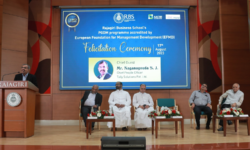
KOZHIKODE:
RBI Deputy Governor M. Rajeshwar Rao noted that India was in a sweet spot to grow robustly amidst global turmoil and monsoon risks to growth but developing credit markets was essential. He was delivering the inaugural address at the IIM Kozhikode’s ‘First Annual Seminar on Banking Regulation, Intermediary Soundness and Systemic Stability’. Laying down his vision he said that to address credit risks, financial intermediaries should consider credit risk as a core element in their strategies. He called for a framework based on five elements of Ms: measuring, monitoring, managing, mitigating, and migrating.
He said that credit risk management tools, “especially for risk transfer or migration, the role of markets is extremely important”. A deep and vibrant market to offload credit exposure could mitigate credit risk and added that the credit market must get nimbler from here. A dynamic secondary market for loan instruments, a wider base of participants and asset classes in the market and a robust framework for risk assessment would help.
The Secondary Loan Market Association (SLMA) platform, which became operational in 2022, has onboarded many major banks and is in process of onboarding other major players including NBFCs. Explaining that the basic idea of the SLMA platform made operational in 2022 was to enable easy transfer of loan(s) at a fair price through market-based auctions rather than bilateral arrangements.
The market for securitisation products is quickly catching up in India and is poised to grow manifold in years to come and hinted that the RBI could prune the negative list for asset securitization.
Prof. Debashis Chatterjee Director IIM Kozhikode emphasized the importance of better developed financial systems to spur innovation, inclusivity and growth. Observing that the integrity of the bankers and the regulators would be an important determinant of the future, he added that IIM Kozhikode’s institutional values Satyam, Nityam and Purnam – authenticity, sustainability and fulfillment; are also invariably the underlying values for financial regulation. He also appreciated the critical role played by RBI in upholding the financial sovereignty of the country and congratulated RBI Governor for receiving A+ rating in the Global Finance Central Banker’s Report Cards 2023, as a testimony to RBI’s global financial leadership.
Prof. Mridul Saggar, Professor & Head of the Centre for Excellence in Macroeconomics, Banking & Finance that organized the Seminar moderated an intense panel discussion, raising the issues of significant strides in global and Indian regulation, though chinks remained. He said that improved corporate governance was important for soundness of the banking system.
Murali Ramakrishnan, MD & CEO, South Indian Bank stated that new regulations have helped and highlighted the role played by building of capital and liquidity buffers.
P.R. Ravi Mohan Chairman, ESAF Small Finance Bank stated that the Banking Regulation Act had wonderful provisions for corporate governance, though Prof. Saggar said they were not applicable to state owned banks that need to be recapitalized with fiscal support.
George Alexander Muthoot, MD, Muthoot Finance pointed out that NBGCs were now left with no regulatory arbitrage and scale-based regulations, in fact, left large NBFCs with greater regulatory burden.
At the Seminar Shyam Srinivasan, MD & CEO of Federal Bank stressed on reasonable balance between innovation and regulation. Prof. Rudra Sensarma pointed to role the financial inclusion itself had played in growth.
All the panelists were of the view that India is on the path to become a solid global player due to robust financial regulations.




